.
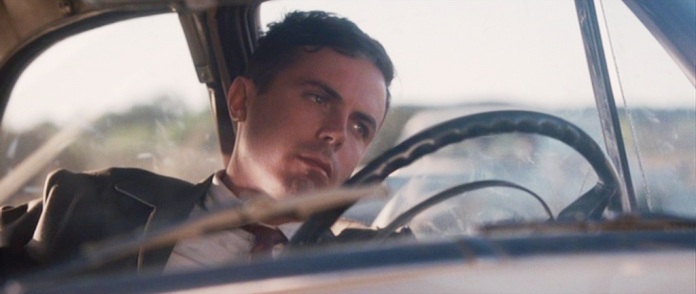
Director: Michael Winterbottom
By Roderick Heath
Michael Winterbottom is one of the most restless and protean of contemporary directing talents, and that has made his oeuvre both consistently surprising and oddly invisible when it comes to audiences and awards. He was probably the most talented of the many interesting British auteurs to emerge in the early ’90s, but he’s been happy enough to keep on searching for new pastures so long as he’s financially and artistically able. In spite of the many different styles and types of stories he’s engaged with, his career has taken on its own sort of shape. Whether reinventing classic literature or composing semi-improvised docudramas, he imbues his work with a fearless physicality and an unflinching comprehension of the mortal and moral cost of many human transactions, balanced by a contradictorily ironic coolness in terms of narrative urgency, and dedication to authentically portraying a context that is as vital as the surface drama to the overall substance of the work. The Killer Inside Me hardly met with universal acclaim or much financial success when it was released earlier this year after enduring some ill-directed controversy, a real pity considering that it is one of the best films of the last 12 months.
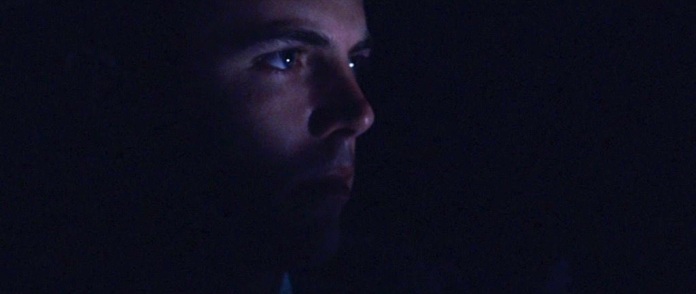
In basing a film on Jim Thompson’s 1949 novel, one of the works that earned Thompson the sobriquet of “the pulp Dostoyevsky,” Winterbottom tackles one of the major cult writers of modern letters. It’s also Winterbottom’s tribute to a down-and-dirty kind of Americana, with nods to Sam Peckinpah, the Coen brothers, and David Lynch, and the morbid strains of American roots music, in addition to the classic pulp refrains. The splendid opening titles evoke the period as Little Willie John’s version of “Fever” accompanies ’50s-style typeface and colour effects printed over stills of the actors, a touch that might seem more playful than the movie that follows. But the choice of song is crucial: in The Killer Inside Me, everybody’s got that fever.
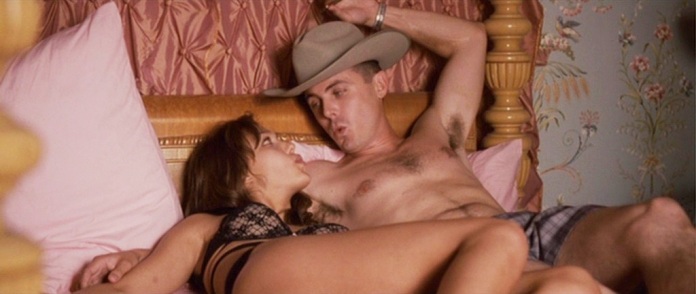
With its first-person focus on the twisted psyche of central character Lou Ford (Casey Affleck, back in Robert Ford mode), The Killer Inside Me is foremost a study of a man whose traits are violently at odds with the maxims and expectations of his world. Lou is a deputy sheriff in a small Texas town during the same period setting as the novel’s writing, his drawling voiceover reiterating his cynical, alien perspective on the human interactions around him. He’s one of those characters without whom the noir genre wouldn’t exist—the bad seed, the freakish weed sprung from the same soil as all the healthy legumes—but here he’s the core protagonist and not some rugged neon knight. His strange thought processes, perverted psychology, empathy-worthy gripes with the world about him, and his contemptible predilections take centre stage.

Lou is called upon to do some of the less dignified housekeeping around town. When he’s sent to give Joyce Lakeland (Jessica Alba), a hooker who’s set up shop on the edge of town, her marching orders, she demands he leave her house and smacks him in the face. This infuriates Lou sufficiently to cause him to drag her into her bedroom and whip her backside with his belt until it’s bloody. This, mordantly enough, proves to be a rather perfect introduction for this sadomasochistically inclined duo. Lou’s also sleeping with his long-time girlfriend Amy Stanton (a splendidly bovine Kate Hudson), but she’s only conventionally naughty. Lou, although theoretically an aberration in such a locale, soon starts to resemble an inevitable by-product of its secrets and sullen cruelty. He’s got an axe to grind with local oil bigwig Chester Conway (Ned Beatty), who may have set up Lou’s adopted brother for a fatal fall because his brother did jail time for the rape of a small girl, a crime Lou actually committed. Chance puts Lou in what strikes him as the perfect position to gain revenge and a windfall when he’s asked to facilitate a payoff that Conway’s thick-witted son Elmer (Jay R. Ferguson) wants to make to Joyce, whom he wants to marry. Instead of agreeing with Joyce’s proposal that they run away together after she’s been paid, Lou beats her to a bloody pulp and then shoots Elmer to make it look as if Elmer assaulted her, and she killed him in self-defence before expiring herself.
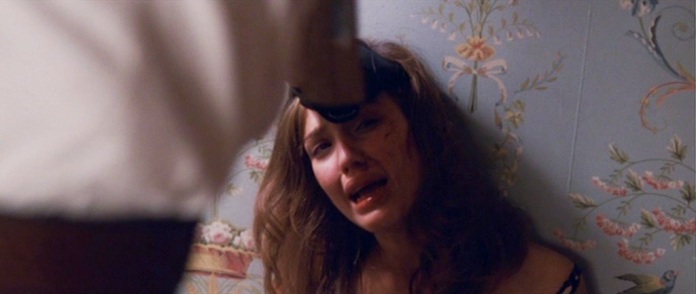
Lou’s attempts to become a master criminal leave him locked in a bad dream of proliferating loose ends: accidental witnesses, suspicious bystanders, and interested parties force him to ever crazier, more self-destructive ends. The money he wanted to steal was marked. He shot Elmer an excessive number of times, confusing and alerting investigators, led by imported detective Howard Hendricks (Simon Baker). His suspicious actions were witnessed by an itinerant (Brent Briscoe), who had good reason to remember Lou, since Lou jammed a lighted cigar into his hand for kicks one night. Lou plays out the basic capitalism-as-murder brief from so many noir tales as a kind of ideal. And yet it becomes clear that Lou’s efforts were never really about enriching himself, or even revenge, but a strange attempt to come to terms with his own nature. His masochistic mother had encouraged him to slap her backside, a dirty secret that infected his erotic nature and psyche with a fascination for violence as a form of self-expression that’s continually threatening to corrode his bland façade. Joyce’s fondness for his physical cruelty is partially a metaphor for the sorts of privileges we allow to loved ones we’d never dream of allowing to other people, but it’s also about a basic reduction that suits an archly macho, capitalistic, power-inflected world that reduces all people to two basic types: those who get hit, and those who do the hitting. For Lou it’s a mere yardstick on the way to achieving a proper consummation of his violent fantasies. He’s an existential void waiting for a time and place to arrive as a creation of pure nihilism. His world alternates between the glare of daylight and the inky sparseness of the night, when his real work begins, a world of dashboard glows and red tail lights, brutality and supple assassination.

The peculiar thing about The Killer Inside Me is that Winterbottom isn’t at first glance the best fit for such a grimy, overheated psychodrama. Where Winterbottom’s instinct is to cool things down even when watching worlds disintegrate, the storyline of Killer cranks up to a finale that’s like the gotterdammerung of Our Town, so bizarre as to possibly be a hallucination. But what makes The Killer Inside Me a particularly vital visit to the classic noir canon is its willingness to dig into aspects of the genre that are still often elided, as in works like Curtis Hanson’s weirdly clean and spiffy adaptation of LA Confidential (1997), particularly violent misogyny, aberrant sexuality, and the underground cable linking private madness and social malfeasance. It’s closer in many ways to being a less overtly surreal Blue Velvet (1986). Winterbottom’s unerring, unmannered widescreen compositions observe the aridity of the town’s environs and watches Lou beat Joyce’s face in with the same clinical dispassion. Part of The Killer Inside Me’s peculiar brilliance is indeed the way it completely sidesteps the usual assumptions of these tales, for there’s no urgency to the efforts to stop Lou.
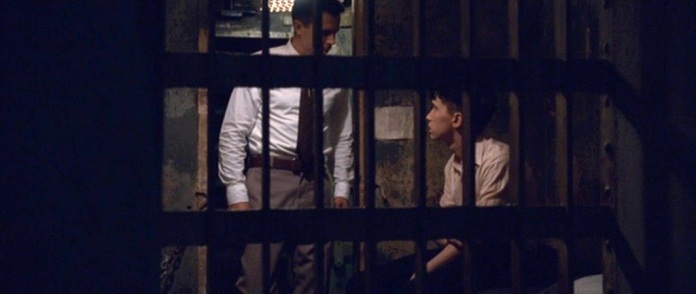
On the contrary, there’s a horrid fascination in watching him quietly annihilate all standards and presumptions. The most defiant quality of the tale is that Lou’s efforts to escape detection and bluff his way out inspire their own kind of unwilling audience identification. He’s the “hero” in all respects, except that he’s an atrocious psychopath. He’s not even a charming or devilishly clever one, like Hannibal Lecter. He’s just an ordinary man. He’s even, in his way, playing out a version of the frustration experienced by James Stewart in It’s A Wonderful Life: a young man who wants to escape his small town rut, but feels compelled to play out a battle with a local plutocrat as a kind of vehicle for exploring his own selfhood. His supple melancholy, his bewilderment about the disparity between his nominal duties and affections and his readiness to trash them all, become the keynote of the film, as if he’s trying to work his way towards some state of total revelatory catharsis that remains out of reach. Lou travels to Fort Worth with Conway, who wants to make sure Joyce survives her coma so he can make sure he sees her “fry” for killing his son, but that relative metropolis is glimpsed tangentially through curtained hotel windows and out of cars, as if there’s a world out there from which Lou is perpetually cut off. That Lou hides secret seams of incongruent grandiosity is signaled by his love of opera, but this proves not that he’s a secret übermensch, but merely a self-dramatist.
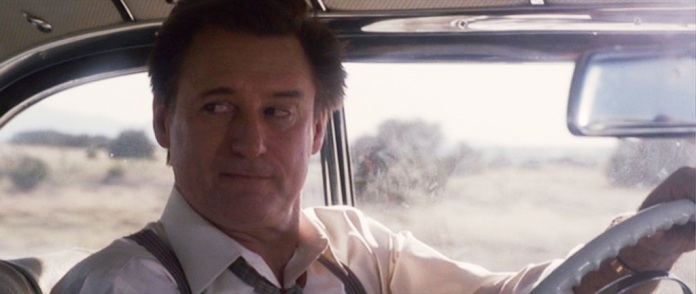
Lou’s assault on Joyce is grotesque and unsettling, but a large part of the point is that Winterbottom emphasises what incredibly hard work it is to try to kill someone with one’s hands, perhaps indeed the best lesson in such difficulty since the murder in Hitchcock’s Torn Curtain (1965). Murder is no aesthetic prop or pop culture game here. Lou’s pummeling of Joyce exhausts him after seeming minutes of constant battery, until he’s sweating and puffing like a man during a workout, and she’s still not dead by the time the rest of his plan is completed. Of course, the real kicker is that Joyce, half-bewilderedly, half-expectantly, murmurs repeatedly as his fists mangle her pretty visage, “I love you.” Here, romantic love is a kind of Calvary where one can choose a quick or slow expiry. By contrast, the way Lou kills Elmer with a gun is stunningly quick. The idea that sex and murderous hate are oft-entwined isn’t a new one, but Lou seems driven to push the notion to the limit in his attempt to kill Joyce. Lou doesn’t hate Joyce; in fact, he has great affection for her. Subsequently he’s beset by flashbacks to their happy bedroom shenanigans, not so much in sadness for what he threw away, but in disturbed curiosity as to why, when she did make him happy, he still felt no compunction in disposing of her. The recurring irony of the story is that Lou perceives himself as victimised, all springing from his childhood “mistake,” and that he offers up anyone, regardless of their place in his life, as a kind of stock character or commodity to play a part in his life script.
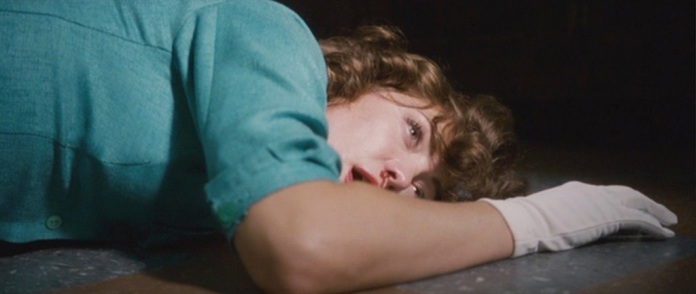
Lou will also drive his boss and father figure, Sheriff Bob Maples (Tom Bower), to suicide. He murders his young friend, gas station attendant Johnnie Pappas (Liam Aiken), in his prison cell, after setting him up as a suspect and trying to make his death look like suicide. We don’t see his killing, but we do see something that’s possibly crueler: as he did with Joyce before killing her, Lou explains very calmly and intimately to Johnny what his game is. Lou is taunted and tailed by several men who all suspect the truth, though they can’t prove it. Hendricks (Simon Baker) is the familiar dogged investigator, who’s usually the narrative focus. He sees through Lou’s smoke screen and tries to prove it, but he’s weirdly ineffective in his righteousness. Local union boss Joe Rothman (Elias Koteas) is sure Lou is a killer, but his confronting Lou is aimed not at bringing him to justice, but making sure Lou hasn’t provided Conway with a charge he can set Rothman up on. The insidiousness of the locality’s vice and corruption are normal; only Lou’s grandiose desire to cut through it all like a marauding shark is abnormal. The vagrant tries to blackmail Lou. Lou responds by killing Amy with a few well-delivered body blows that leaves her expiring in a pool of her own urine, so as to set the vagrant up for her murder. There’s a truly abyssal humour in the peevishness with which Lou shouts at the vagrant over Amy’s broken body, “You stupid son of a bitch! I was gonna marry this woman!” as if really saying, “Now look what you made me do!” That’s a prelude to the sight of him relentlessly pounding the man after he’s been shot dead by one of his fellow deputies (Matthew Maher) with the fury of a man who genuinely believes this poor patsy was responsible for Amy’s death.

Hendricks throws Lou in jail and tries to break him. That doesn’t work, but Lou soon confesses to his posturing, preacher-like attorney Billy Boy Walker (a surprising Bill Pullman) after Walker gets him out: the need to externalise the truth of the strange odyssey he’s been on trumps his good sense, as they drive across terrain where the telephone lines look like ranked crucifixes. Lou’s efforts prove entirely self-defeating, but Lou’s distanced sense of cause and consequence builds to the crucial psychic epiphany, after being beset by flashbacks to his bedroom pleasures with Joyce, and his frankly carnal rutting with Amy, that they’re special to him, and yet not finally important at all. There’s a blank carnality to the sex scenes as well as the violent ones.

Lou, in bed with Amy, even covers her face as he screws her, seemingly trying to pretend she’s Joyce, but finally seeming more as if Lou senses that everyone, under the assumed manners of human civilisation, is actually just another version of the same basic animal that eats, fucks, and dies. Finally, Lou learns how Sartre’s maxim “Hell is other people” applies to him: he can’t elude their suspicions forever. Winterbottom doesn’t quite pull off the mad conclusion, but there’s still the extraordinary image of Joyce, who’s been kept alive but under wraps by Conway, with her face now a patchwork of scars and stitch marks, still stumbling pathetically towards her abuser/lover, his very own Frankenstein’s monster welcoming the knife he plunges into her belly before Lou’s world explodes in very literal flames. l

Well, if I had to choose, I’d say that “The Trip” is the far superior Winterbottom output of this year (2010).
About this movie, while I think the acting is really good and the cinematography gorgeous, I had many troubles following the story, it shows when you explain the plot in the fourth paragraph (and just the start of the movie) how convoluted it really is.
I know it’s based on a book, but for me it failed at making the events clear and who was who and wanted what.
Anyway, it’s still worth a watch for me, given the technical and acting aspects mentioned.
LikeLike
The Killer Inside Me?
Hey Rod, what’s the weather like Down Under. Any chance of snow? Wait that’s right, you are having summer now.
I do like Winterbottom’s THE CLAIM, JUDE and especially WONDERLAND.
Excellent review as always.
LikeLike
Right at the moment I’d say snow doesn’t feel like such an impossibility.
LikeLike
I saw this in the theater and didn’t really like it, though I did tell myself I’d rewatch it once the dvd arrived. A reason I really was turned off was the blunt sound of the Alba beating scene. Not that I was offended by it’s brutality, but in the theater it was so fake and over produced it sounded like a bad ‘Saw’ film (you seem to think it was realistic, and I was left wanting it to be more realistic). I generally attributed this to the levels of volume in the theater.
This review also makes me want to revisit asap. I like Winterbottom at least as much as you seem here, and thought Affleck was again affective.
LikeLike
Excellent write-up. This film will get no awards, Black Swan will get plenty; let’s see where they both are in ten years time.
Incidentally, to agree with the above, ‘The Trip’ was wonderful television and perhaps more ‘pure’ Winterbottom, if there is such a thing.
Anyway, this movie’s in my top 5 of the year.
LikeLike
Actually, Colin, where you bring up Black Swan, I admit to contemplating Winter’s Bone in the same light. Yes, that’s a good film, but it’s also a far more clear-cut, familiar, rah-rah take on the noir film and secret degeneracy in the American heartland than this one.
I haven’t seen The Trip yet (not Winterbottom’s, at any rate – Corman’s on the other hand…).
LikeLike
Point taken, but I’d suggest that they’re two separate entities. Winter’s Bone was released mid-year and was then pounced upon by critics and reviewers. I don’t believe it had any plans to be this year’s Big Thing; it just tried to be as good as it could, and I think it succeeds. Ditto with this Winterbottom movie. Black Swan – whose initials say more than any review could – has set its aim higher and fails spectacularly, at least in my eyes.
LikeLike
Hmmm…Unfortunately, I haven’t read Thompson’s book (nor have I watched this neo-noir yet…(with “yet” being the operative word here… I was just “introduced” to (Thompson’s novel) work…as a matter of, fact…
…I must admit that this review is very well-written, very descriptive and go hand-in-hand with the image that I have linked Of the “bravado” of Affleck’s character Lou Ford, that you have written in great detail about here in your review.
Killer Inside Me
[Postscript: The Official Website Is Very beautiful…]
Thanks, for sharing!
DeeDee 😉 🙂
LikeLike
Colin: I get your point, although I can’t criticize a filmmaker for aiming as high as they can, only for not hitting their target (and I still haven’t seen Black Swan so I still can’t make a more direct comment there).
What I can say is I’m starting to lose my tolerance for the kind of criticism by omission that favours films that deliver less comforting messages than ones we would like for reasons of personal orthodoxy: the film with the correctly positivist message gets a lot further than the film with the much darker, less immediately reducible one. That’s not to say I prefer bludgeoning miserabilism, which often commits the opposite crime of treating audiences and characters alike as things to be sadistically knocked about, but the fact that The Killer Inside Me, which, in its own fucked-up way, says more pertinent things about violence in society and between men and women than Winter’s Bone, gets vilified before release, and Winter’s Bone, which finishes on a virtually cozy note, gets raved about in spite of being less sophisticated filmmaking, makes me very wary.
DeeDee: I hardly expect (and previous comments here support this) that everyone will enjoy this film or even see its qualities, so, when you do watch it, keep in mind that it’s a harsh and strange film. But, as ever, I try to elucidate my point of view with thoroughness and clarity, and hope that provides a road-map to finding those qualities.
BTW, yeah, that’s a good-looking website. Thanks for linking and commenting!
LikeLike
Rod, I share your views re: political correctness (for lack of a better buzz-phrase) entirely, but that was not my point. Still, it’s my own fault for originally comparing apples with oranges. I think The Killer Inside Me is a fine film, one of the year’s best, and one of Winterbottom’s finest hours. I also believe Winter’s Bone to be excellent (IMO, better than ‘Killer’, but not for the reasons you intimate). I was just choosing the wrong medium to criticise the fact that this movie was overlooked by most whereas Black Swan garners praise from all four corners of the globe.
I value the input that this excellent, critical site adds.
LikeLike